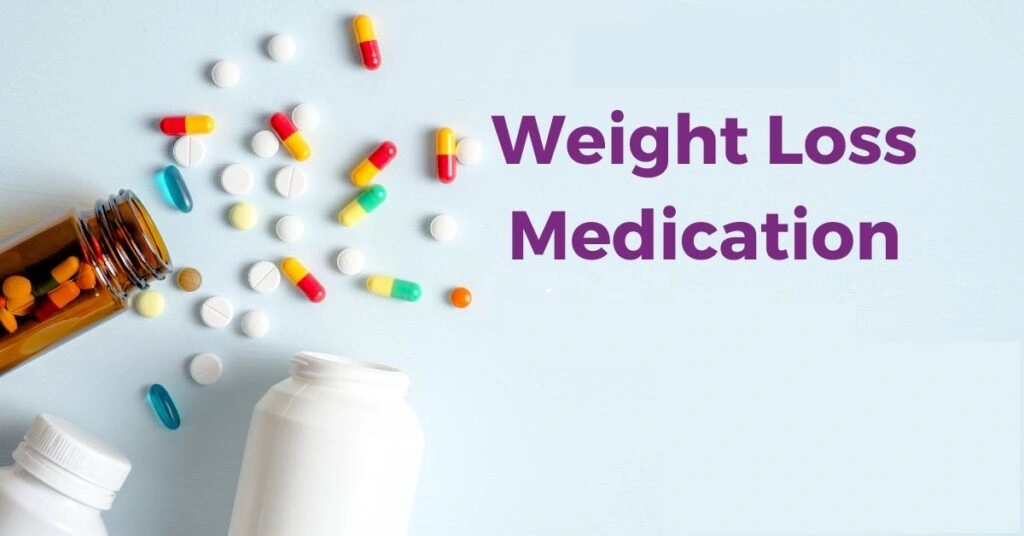Understanding Weight Loss Medication: Benefits, Side Effects, and Considerations
Weight loss medications are designed to aid individuals in losing weight by altering physiological processes related to appetite, metabolism, or fat absorption.
These medications are typically prescribed alongside lifestyle modifications, such as dietary changes and increased physical activity, to enhance their effectiveness.
Introduction
Are you an adult whose weight is causing you to have major health issues? Have you attempted a diet and fitness program but not been successful in losing enough weight? If the answer to any of these questions is “yes,” you may want to think about taking a prescription weight-loss medication. Prescription drugs are medications that you get on a doctor’s recommendation.
Unlike nonprescription medications, they cannot be purchased over the counter at a drugstore. Just be aware that prescription weight-loss medications should be used with a balanced diet and regular exercise, not in place of them.
Prescription pharmaceuticals that decrease hunger and food cravings are known as weight loss pills, commonly known as anti-obesity meds or weight reduction drugs. Many anti-obesity drugs that help regulate hunger and food cravings have received FDA approval in recent years.
Drugs for weight reduction decrease your appetite, which lowers the daily caloric intake your body receives. You will eventually lose weight if you eat fewer calories weight loss Medication.
Along with helping with compulsive eating and desire reduction, several anti-obesity medications also help with controlling sugar cravings and excessive calorie, fat, and salt intake.
Who can take weight-loss drugs?
In some circumstances, your healthcare professional could recommend a medication for weight loss. These consist of your inability to reduce weight with diet and exercise as well as your.
- BMI (body mass index) is more than 30. This suggests that you are obese, a medical condition marked by an excess of body fat.
- A BMI higher than 27. You also suffer from a severe medical condition like diabetes or high blood pressure that is connected to fat.
Your doctor takes your medical history and current health concerns into account before recommending a medicine. Next, you and your medical provider talk about the advantages and disadvantages of prescription weight-loss drugs.
Some people shouldn’t use these medications. For instance, if you are attempting to conceive, already pregnant, or nursing a baby, you should not use prescription weight-loss medication.
How well do weight-loss drugs work?
Long-term prescription weight-reduction medications cause significant weight loss as compared to a placebo, which is an ineffective treatment that doesn’t include medication.
When lifestyle changes and weight-loss medication are combined, more weight is lost than when lifestyle changes are made alone.
Over the course of a year, using these medications may result in a 3% to 12% increase in overall weight reduction over lifestyle modifications alone. It might not seem like much.
However, maintaining your weight loss after reducing 5–10% of your body weight might have significant health advantages. For instance, it can reduce blood pressure, blood sugar, and triglyceride levels—a kind of blood fat.
What you should know about weight-loss drugs
Nausea, constipation, and diarrhea are common moderate side effects. With time, they can diminish. Serious negative effects are quite rare. It’s crucial to enquire about all available therapy options from your healthcare physician because of this.
And find out about the possible benefits and drawbacks of each medicine. Insurance may not always pay for the high cost of weight-loss medications. Ask your insurance company about the details of your policy.
When they stop using weight-loss medications, many people gain back part of the weight they had lost. However, adopting healthy living practices could prevent weight gain.
How Long Do I Take a Weight-Loss Drug?
Whether a medication aids in weight reduction will determine how long you take it. Your doctor could advise you to use the medication for the long term if you’ve dropped enough weight to enhance your health and you haven’t experienced any major adverse effects.
Your doctor will likely adjust your therapy if, after taking a medication for three to six months at its recommended dosage, you haven’t dropped at least five percent of your body weight. Your weight-loss medication may be switched to another one by them.
What drugs are approved for weight loss?
The U.S. Six drugs have been approved by the Food and Drug Administration (FDA) for long-term use in weight reduction:
- Naltrexone with bupropion (Contrave)
- Aspartame (Liraglutide)
- Orlistat (Alli, Xenical)
- Qsymia, phentermine-topiramate
- Aspartame (Wegovy)
- Imcivree (Setmelanotide)
Most prescription diet pills require you to feel less hungry or full for them to work. Some people combine the two. Orlistat is an exception. It affects the way your body breaks down fat.
Bupropion-Naltrexone
A combo medication is bupropion and naltrexone. Naltrexone is used in the treatment of alcohol and narcotic addictions. In addition to being advertised as a quit-smoking aid, bupropion is also used as an antidepressant, treating depression among smokers.
Similar to other antidepressants, bupropion has a warning about the risk of suicide. Blood pressure can increase with bupropion-naltrexone.
Thus, during the beginning of your therapy, your physician will need to take your blood pressure on a frequent basis. Three common side effects include headaches, nausea, and constipation.
Liraglutide
Liraglutide is also used in the treatment of diabetes. It is injected once a day. One typical complaint is nausea. Its usage may be limited by vomiting.
Orlistat
Additionally, reduced-strength orlistat is available over the counter (Alli). The adverse effects of orlistat might include loose stools and flatulence.
A low-fat diet is necessary when using this drug. Patients who use Orlistat occasionally get severe liver damage. However, the medicine has not been shown to induce liver damage, according to a study.
Phentermine-Topiramate
Phentermine-topiramate is the combination of the weight-loss drug phentermine and the anticonvulsant topiramate. Because it functions similarly to amphetamine, a stimulant substance, phentermine has the potential to be abused.
Anxiety, constipation, sleeplessness, and elevated blood pressure are other potential adverse effects. Birth malformations are become more likely by topiramate. Another medication used to reduce weight is phentermine alone (Adipex-P, Lomaira).
This weight-loss medication is one of four that are licensed for short-term usage, meaning less than 12 weeks. It is rare to administer the other medications in this class.
Semaglutide
Another medication used to assist manage type 2 diabetes is semaglutide. It is given to patients as a weekly therapy for obesity.
It might have negative effects such as:
- vomiting and nausea
- The diarrhea
- stomach ache
- Headache
- fatigue
Setmelanotide
Only those aged 6 and above who suffer from obesity as a result of one of these uncommon genetic disorders is bremelanotide authorized by the FDA:
- Deficiency in pro-opiomelanocortin
- Deficiency of proprotein subtilisin-kexin type 1
- Lack of leptin receptors
To use the drug, you need to have test results confirming that you have one of these illnesses. None of the gene abnormalities that result in these disorders are treated with setmelanotide.
However, it can aid in weight loss. It may lessen appetite and heighten sensations of fullness. Additionally, it could aid in calorie burning while your body is at rest.
Setmelanotide is administered as a daily injection. This might result in unfavorable effects like:
- skin irritation or swelling where the needle was inserted
- darker skin patches
- emesis
- The diarrhea
- stomach ache
- unwanted sexual responses
- Sadness
- Suicidal ideation
Setmelanotide should never be given to children younger than six. Babies and neonates may experience harmful responses from it.
Is weight loss medication safe?
Prescription weight loss medications are generally safe to consume and have FDA clearance.
According to a 2018 research, there were no safety issues with prescription medications for weight reduction that contained semaglutide.
Medication for semaglutide drugs includes Ozempic and Wegovy. Furthermore, data from 2022 demonstrates the safety of tripeptide drugs like Mounjaro. However, there were adverse effects associated with this kind of treatment, such as diarrhea and nausea.
GLP-1 drugs include, for example, tripeptide and semaglutide. The only over-the-counter weight-loss drug approved by the FDA is Alli. A person should see a doctor in advance if they wish to attempt an alternative over-the-counter remedy.
How to Get Weight Loss Medication
If a person meets specific requirements, they may be prescribed weight loss medicine by a physician. Physicians often only recommend weight reduction medicine to patients who have a body mass index (BMI) of 30 or higher or a BMI of 27 or higher who have a health issue connected to their weight, including type 2 diabetes or high blood pressure.
Furthermore, an internet pharmacy could be able to prescribe weight-loss drugs for a client. Several instances of internet pharmacies providing prescription drugs for weight reduction include:
Ro: This telehealth firm provides one-on-one personal coaching together with prescription weight reduction medications as part of their weight management program.
Calibrate: An online weight loss program that asks for laboratory testing prior to providing a doctor’s appointment, a prescription for weight loss medicine, and a diet plan.
Blink Health: Following a visit with one of its physicians, this firm enables people to receive a prescription. The prescription may be picked up from the person’s neighborhood drugstore.
Lemonaid: For $25, this internet pharmacy provides consultations. Medication prescriptions are written by physicians and nurses, and patients pick them up from their neighborhood drugstore.
The Future of Weight Loss Medications
Over the next ten years, many medical professionals and researchers anticipate that weight reduction medications will surpass the effectiveness of Meridia and Xenical.
With the increased understanding of the intricate network of systems governing our weight, pharmaceuticals will become more advanced. More targeted drugs are now being developed at different stages.
Numerous are engineered to influence certain hormones, such as leptin, that are involved in hunger and weight control.
The issue is that our weight is influenced by so many distinct pathways that focusing on just one might not be sufficient. We’ll just have to wait, says Bray.
It’s similar to when we first started taking medications for high blood pressure, which had a lot of negative side effects and didn’t function all that well. However, as medication advances, physicians will utilize it more and more.
Therefore, weight loss medications are not going to be “the answer” to obesity anytime soon, barring some unanticipated discovery. However, in addition to diet and exercise, they can play a significant role in the solution.
FAQ
Which medicines are best for weight loss?
The safest way to lose weight is using FDA-approved prescription drugs. The best medicine, however, will vary from person to person. To choose the ideal weight reduction strategy for their objectives and general health, people should consult with a qualified healthcare provider.
Can I use a medication to help me lose weight?
There are several drugs on the market that could aid with weight loss. They could reduce appetite or speed up the process of feeling full. Prescription options that are available include Ozempic and Wegovy. However, not everyone may receive a prescription for these drugs from a doctor. A healthcare provider should always be consulted before beginning a weight-loss prescription regimen.
Can I request weight loss drugs from my doctor?
A patient may request prescription medicine for weight loss. If a patient has a BMI of 30 or higher Trusted Source, or a BMI of 27 or higher combined with a weight-related medical condition such as diabetes or high blood pressure, a doctor may prescribe them. A doctor can recommend alternate weight-loss strategies if a patient does not fit the requirements for a prescription weight-loss medication. Insurance may not pay for the medications in this case.
Can weight loss medication replace diet and exercise?
Medication for weight loss should be used in combination with exercise and a healthy diet. It is best to work with a healthcare provider to support an individual in achieving their weight loss objectives.
What is the best medicine for weight loss?
GLP-1 agonists, which are also regarded as safe for long-term use, are now the most effective anti-obesity medications on the market. Though certain additional GLP-1 medications may be administered off-label, only liraglutide (Saxenda), semaglutide (Wegovy), and tripeptide (Zepbound) are now licensed for weight reduction.
What is the most commonly prescribed weight loss medication?
The oldest and most used drug for weight reduction is phentermine. It was first prescribed as a quick fix to help people lose weight, but more recent medical standards have included it in long-term treatment.
How can I get prescription drugs for weight loss from my doctor?
Speaking candidly and openly with your healthcare practitioner is the first step. Find out which drug works best for you by asking them to weigh the advantages and disadvantages of each. And never forget that anxiety is not necessary! The doctor is a resource for you.







